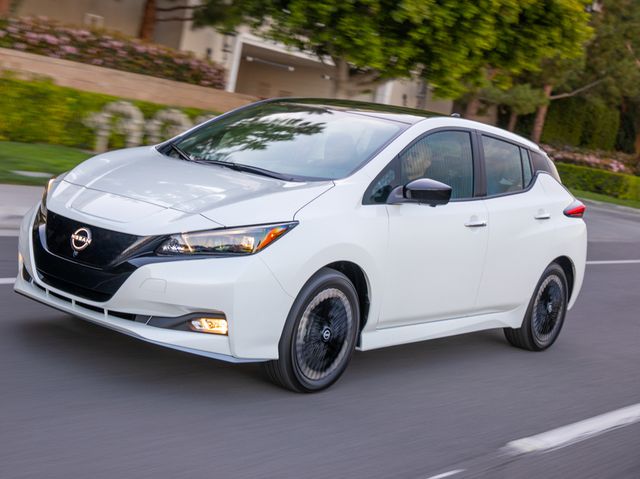
Electric cars can be an environmentally-friendly alternative for gasoline-powered vehicles. They can help reduce carbon emissions and pollution while providing a competitive driving experience. These vehicles could be eligible for federal tax credits. Even though they are more expensive than fuel-powered vehicles in terms of initial cost, they can still save you money in long-term.
An electric vehicle's primary benefit is that it does not rely on fossil energy. However, there are some downsides to owning one. The biggest is that they may not be feasible for homeowners in rural areas. The limited range of some electric vehicles is another problem. Some cars can only travel 80 to 100 miles per full charge. This may be a drawback for some people who require a longer range.
The battery is the most crucial component of an electric vehicle. The battery must be maintained and replaced on a regular basis. It is possible for the battery's to become damaged if it has been in use for a long period of time. The cost to replace a car's battery is often higher than the price of the vehicle.

One of the major disadvantages of an EV is that it requires a lot of refueling. There are limited access to refueling stations. They are located in urban areas and not in rural areas. This means that your vehicle may need to be charged by a third party.
It is also common for gas-powered vehicles to cost less than their electric counterparts on a weekly basis. This is due in part to the lower price of electricity. Depending on where you live, your fuel costs can vary considerably. The average price of electricity for an EV costs 25% less than gasoline.
The range of an EV is different from model model to model. Some models have ranges of 80-100 miles, others range over 300 miles. This can make it harder to choose an electric car. It's also important to note that an EV's range varies greatly between seasons. A battery can travel a maximum distance of 124 miles in winter. In the summer, however, the range will be restricted to 186 miles. In emergency situations, it is more difficult for an E-V to cover long distances.
In addition to the range limitations, electric vehicles are expensive to purchase. They are typically more expensive to maintain than gas-powered cars. In the long run, they will be more expensive to maintain than their petrol-powered counterparts. Also, the replacement cost of the battery module can be quite high. It will cost you between $20,000-$35,000 to replace. While this can help offset the initial cost of an electric vehicle, it can be hard to recover the cost with lower fuel costs and maintenance.

An EV has a longer life span than conventional gas-powered vehicles. Although most vehicles don't require oil changes, EVs will still need to be charged up periodically. A typical battery module lasts between seven and eighteen years. However, the cost of replacing a battery module is much less than maintaining a gasoline-powered vehicle.
FAQ
Do I need to have a degree to work as an automotive mechanic? Can I study part time?
It is not essential, but it is helpful. Employers will prefer candidates who have completed a degree. It shows that your efforts have been put in and you have succeeded.
You can still study while working, however. Some universities allow students the flexibility to finish coursework during summer vacations and resume their studies later in year. Others allow students to study part-time all year.
What length is an automotive mechanic apprenticeship?
An automotive mechanic apprenticeship takes around three years to complete. It includes two years of school and two years as an apprentice. The first year is used to learn all aspects of the trade including safety procedures and theory. You will also learn to use tools efficiently and safely during this period. After you have completed the first year of training, you will be able to spend an additional year on-the job learning different trades. These years will offer you the opportunity to attend formal classes.
The last year of the program is dedicated to gaining certification and qualifications in the field. These include NVQs, which are obtained after passing industry-specific exams. There are also HNCs (Higher National Certificates), which cover general subjects like management, business administration, customer service, and more. Finally, there are City & Guilds certificates that are offered for those who wish to become qualified in certain trades.
How can I fix my car as a hobby?
Take up a hobby in car repair if you have an interest. You can repair them, buy their parts, sell them, or just have fun with them. It's a fun hobby that you can do if it interests you.
But it is not easy to turn this into your full-time occupation. This requires dedication and hard work. Also, you will need to put a lot of money into it.
You might not have a compelling reason to get involved in the car industry.
Is it possible to work as an automotive mechanic?
It is possible. Garages often advertise their jobs online and people just apply because it seems fun. Try applying to a few jobs and seeing if the garages accept student applications. If you don't know anyone working in the industry, ask your friends and relatives. They might be happy to recommend someone.
How long does an automotive course take?
A course in automotive lasts three years.
The first year is spent learning about cars and theory. The second year will be spent in practical training. Here you will learn how fix engines, drive and other mechanic jobs. You will spend the final year working in a local garage to gain real-world experience.
How can I prepare for a apprenticeship as a mechanic?
Understanding what you're getting into is crucial. It is important to know the basics of how cars work. This will help you to plan your first day in the garage.
It is also important to be able to fix small problems like broken lights or tires.
This will teach you how to diagnose problems and fix them yourself.
For the purpose of putting them back together again, you'll need to be able to identify how each piece fits together.
Finally, you should be able use tools safely.
All these aspects will help you become a competent technician.
How long does a good mechanic take?
To become a skilled mechanic, you need years of experience and practice. Working under the guidance of a professional mechanic is the best way to learn how repair cars.
You will have to spend time in a garage learning about cars and mechanics. You will need to be familiar with mechanical engineering books about mechanics, car design, and other topics.
You will also need to go to auto school.
It's important to start early. You don't have to wait until you are older to start studying automotive technology. If you want to qualify as a mechanic, get started now!
Statistics
- 52% of Mechanics in the United States think their salaries are enough for the cost of living in their area. (indeed.com)
- According to the BLS, the median annual salary for automotive service technicians and mechanics in the United States was $44,050 in May 2020. (uti.edu)
- There were 749,900 jobs available for automotive service technicians and mechanics in 2016, which is expected to grow by six percent through 2026. (jobhero.com)
External Links
How To
How to set up a business plan for a car repair shop
Before you can do anything else, it is important to have a solid understanding of how to begin a business. First, you need to decide what kind of business you want to start. Consider starting in a small area with few competition. It will make it easier to find another job, even if things go wrong. If you decide to open your own auto repair shop, then you'll probably want to choose a location near a large population base. Customers will be able come to you when they have issues and you'll be willing to sell them parts at a low price.
Franchise opportunities are a great option when you're just starting out. Franchises typically require less capital than traditional businesses. However, you still have to pay royalties and fees to the franchisor every month. It is also important to know that you must be very careful when choosing a franchise because some franchises are scams. Many franchises promise high returns, but do not deliver.
If you have retail experience, you may be able to start your own auto-repair shop. Many entrepreneurs who have started their own businesses claim it was one of their best decisions. But, before you start your business, you need to have a plan. Make sure you write down everything you want your business to accomplish. Some examples of goals might be increasing sales, customer service and lowering costs. These goals are important to set and can be used as a guideline for how you will achieve them.
If you are interested in opening a repair shop for autos, the next thing is to determine how to finance it. In order to finance their businesses, the majority of people borrow money from credit unions and banks. Banks often require collateral. This means that you need something of value to provide security. People may even be able to borrow against their homes. You will need to demonstrate that you have sufficient cash flow for the loan repayments to qualify for a loan.
Once you have financed your business, you'll need to secure a license. There are several licenses that you could obtain, depending on the type and purpose of your business. For instance, auto mechanics will need a state license. Body shops only require a Federal license.
Marketing strategies are the last thing that you should do. Before you start advertising, you'll need to determine exactly what you want your company to stand for. What makes your business different from other companies? How can your business improve on the work of others? These are all important questions to ask when creating a strong brand identity. With this information, you'll be better prepared to design effective advertisements.